NBA All-Star Game Kobe Bryant Most Valuable Player Award
The NBA All-Star Game Kobe Bryant Most Valuable Player[1] (MVP) is an annual National Basketball Association (NBA) award given to the player(s) voted best of the annual All-Star Game. The award was established in 1953 when NBA officials decided to designate an MVP for each year's game. The league also re-honored players from the previous two All-Star Games. Ed Macauley and Paul Arizin were selected as the 1951 and 1952 MVP winners respectively.[2] The winner is voted upon by a panel of media members, who cast their vote after the conclusion of the game. The fan voting accounts for 25% of the voting. The player(s) with the most votes or ties for the most votes wins the award.[3] In February 2020, Commissioner Adam Silver renamed the NBA All-Star Game Most Valuable Player in honor of four-time winner Kobe Bryant, who died in a helicopter crash a few weeks earlier.[1]
| National Basketball Association awards and honors | ||
|---|---|---|
| Championship | ||
|
||
| Individual awards | ||
|
||
| Honors | ||
As of 2022, the most recent recipient is Golden State Warriors point guard Stephen Curry. Bryant and Bob Pettit are the only two players to win the All-Star Game MVP four times. Oscar Robertson, Michael Jordan, Shaquille O'Neal, and LeBron James have each won the award three times, while Bob Cousy, Julius Erving, Isiah Thomas, Magic Johnson, Karl Malone, Allen Iverson, Russell Westbrook, and Kevin Durant have all won the award twice. James became the youngest to win the award in 2006 at the age of 21 years and 1 month.[4] No All-Star Game MVP was named in 1999 since the game was canceled due to the league's lockout.[5] Four of the games had joint winners—Elgin Baylor and Pettit in 1959, John Stockton and Malone in 1993, O'Neal and Tim Duncan in 2000, and O'Neal and Bryant in 2009. O'Neal became the first player in All-Star history to share two MVP awards as well as the first player to win the award with multiple teams. The Los Angeles Lakers have had eleven winners while the Boston Celtics have had eight. Duncan of the U.S. Virgin Islands, Kyrie Irving of Australia, and Giannis Antetokounmpo of Greece are the only winners not born in the United States. Both Duncan and Irving[lower-alpha 1] are American citizens, but are considered "international" players by the NBA because they were not born in one of the fifty states or Washington, D.C.[6] Antetokounmpo of Greece is the only winner to be trained entirely outside the U.S.; Irving lived in the U.S. since age two, and Duncan played U.S. college basketball at Wake Forest.
Bob Pettit (1958, 1959) and Russell Westbrook (2015, 2016) are the only players to win consecutive awards. Pettit (1956), Bob Cousy (1957), Wilt Chamberlain (1960), Bill Russell (1963), Oscar Robertson (1964), Willis Reed (1970), Dave Cowens (1973), Michael Jordan (1988, 1996, 1998), Magic Johnson (1990), Shaquille O'Neal (2000), and Allen Iverson (2001) all won the All-Star Game MVP and the NBA Most Valuable Player Award in the same season; Jordan is the only player to do this multiple times.[7] Fourteen players have won the award playing for the team that hosted the All-Star Game: Macauley (1951), Cousy (1957), Pettit (1958, 1962), Chamberlain (1960), Adrian Smith (1966), Rick Barry (1967), Jerry West (1972), Tom Chambers (1987), Michael Jordan (1988), Karl Malone (1993), John Stockton (1993), O'Neal (2004, 2009), Bryant (2011) and Davis (2017); Pettit and O'Neal did this multiple times. Kareem Abdul-Jabbar has the distinction of playing in the most All-Star Games (18) without winning the All-Star Game MVP, while Adrian Smith won the MVP in his only All-Star Game.
Winners
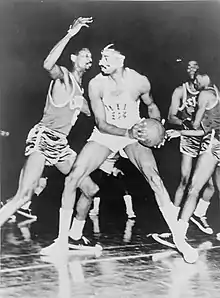
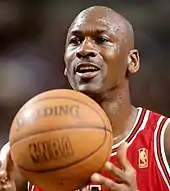
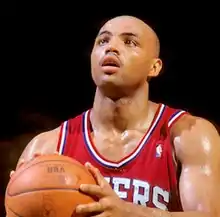
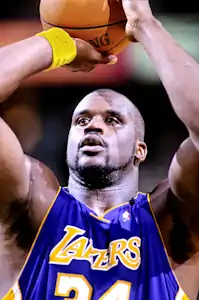
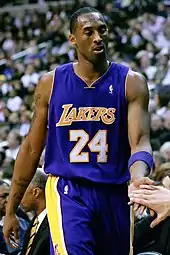
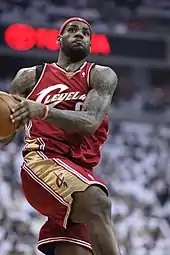
.jpg.webp)
_(cropped).jpg.webp)
| ^ | Denotes player who is still active in the NBA |
| * | Elected to the Naismith Memorial Basketball Hall of Fame |
| Player (X) | Denotes the number of times the player has been awarded the MVP award |
| Team (X) | Denotes the number of times a player from this team has won |
| Season | Player | Position | Nationality | Team |
|---|---|---|---|---|
| 1951 | Ed Macauley* | Center/Forward | Boston Celtics | |
| 1952 | Paul Arizin* | Forward/Guard | Philadelphia Warriors | |
| 1953 | George Mikan* | Center | Minneapolis Lakers | |
| 1954 | Bob Cousy* | Guard | Boston Celtics (2) | |
| 1955 | Bill Sharman* | Guard | Boston Celtics (3) | |
| 1956 | Bob Pettit* | Forward/Center | St. Louis Hawks | |
| 1957 | Bob Cousy* (2) | Guard | Boston Celtics (4) | |
| 1958 | Bob Pettit* (2) | Forward/Center | St. Louis Hawks (2) | |
| 1959[lower-alpha 2] | Elgin Baylor* | Forward | Minneapolis Lakers (2) | |
| Bob Pettit* (3) | Forward/Center | St. Louis Hawks (3) | ||
| 1960 | Wilt Chamberlain* | Center | Philadelphia Warriors (2) | |
| 1961 | Oscar Robertson* | Guard | Cincinnati Royals | |
| 1962 | Bob Pettit* (4) | Forward/Center | St. Louis Hawks (4) | |
| 1963 | Bill Russell* | Center | Boston Celtics (5) | |
| 1964 | Oscar Robertson* (2) | Guard | Cincinnati Royals (2) | |
| 1965 | Jerry Lucas* | Forward/Center | Cincinnati Royals (3) | |
| 1966 | Adrian Smith | Guard | Cincinnati Royals (4) | |
| 1967 | Rick Barry* | Forward | San Francisco Warriors (3) | |
| 1968 | Hal Greer* | Guard/Forward | Philadelphia 76ers | |
| 1969 | Oscar Robertson* (3) | Guard | Cincinnati Royals (5) | |
| 1970 | Willis Reed* | Center/Forward | New York Knicks | |
| 1971 | Lenny Wilkens* | Guard | Seattle SuperSonics | |
| 1972 | Jerry West* | Guard | Los Angeles Lakers (3) | |
| 1973 | Dave Cowens* | Center/Forward | Boston Celtics (6) | |
| 1974 | Bob Lanier* | Center | Detroit Pistons | |
| 1975 | Walt Frazier* | Guard | New York Knicks (2) | |
| 1976 | Dave Bing* | Guard | Washington Bullets | |
| 1977 | Julius Erving* | Forward | Philadelphia 76ers (2) | |
| 1978 | Randy Smith | Guard/Forward | Buffalo Braves | |
| 1979 | David Thompson* | Guard/Forward | Denver Nuggets | |
| 1980 | George Gervin* | Guard/Forward | San Antonio Spurs | |
| 1981 | Nate Archibald* | Guard | Boston Celtics (7) | |
| 1982 | Larry Bird* | Forward | Boston Celtics (8) | |
| 1983 | Julius Erving* (2) | Forward | Philadelphia 76ers (3) | |
| 1984 | Isiah Thomas* | Guard | Detroit Pistons (2) | |
| 1985 | Ralph Sampson* | Center/Forward | Houston Rockets | |
| 1986 | Isiah Thomas* (2) | Guard | Detroit Pistons (3) | |
| 1987 | Tom Chambers | Forward/Center | Seattle SuperSonics (2) | |
| 1988 | Michael Jordan* | Guard | Chicago Bulls | |
| 1989 | Karl Malone* | Forward | Utah Jazz | |
| 1990 | Magic Johnson* | Guard | Los Angeles Lakers (4) | |
| 1991 | Charles Barkley* | Forward | Philadelphia 76ers (4) | |
| 1992 | Magic Johnson* (2) | Guard | Los Angeles Lakers (5) | |
| 1993[lower-alpha 2] | John Stockton* | Guard | Utah Jazz (2) | |
| Karl Malone* (2) | Forward | Utah Jazz (3) | ||
| 1994 | Scottie Pippen* | Forward | Chicago Bulls (2) | |
| 1995 | Mitch Richmond* | Guard | Sacramento Kings (6) | |
| 1996 | Michael Jordan* (2) | Guard | Chicago Bulls (3) | |
| 1997 | Glen Rice | Forward | Charlotte Hornets | |
| 1998 | Michael Jordan* (3) | Guard | Chicago Bulls (4) | |
| 1999 | Not awarded as the game was canceled due to the league's lockout.[5] | |||
| 2000[lower-alpha 2] | Shaquille O'Neal* | Center | Los Angeles Lakers (6) | |
| Tim Duncan* | Forward/Center | San Antonio Spurs (2) | ||
| 2001 | Allen Iverson* | Guard | Philadelphia 76ers (5) | |
| 2002 | Kobe Bryant* | Guard | Los Angeles Lakers (7) | |
| 2003 | Kevin Garnett* | Forward/Center | Minnesota Timberwolves | |
| 2004 | Shaquille O'Neal* (2) | Center | Los Angeles Lakers (8) | |
| 2005 | Allen Iverson* (2) | Guard | Philadelphia 76ers (6) | |
| 2006 | LeBron James^ [lower-alpha 4] | Forward | Cleveland Cavaliers | |
| 2007 | Kobe Bryant* (2) | Guard | Los Angeles Lakers (9) | |
| 2008 | LeBron James^ (2) | Forward | Cleveland Cavaliers (2) | |
| 2009[lower-alpha 2] | Kobe Bryant* (3) | Guard | Los Angeles Lakers (10) | |
| Shaquille O'Neal* (3) [lower-alpha 5] | Center | Phoenix Suns | ||
| 2010 | Dwyane Wade | Guard | Miami Heat | |
| 2011 | Kobe Bryant* (4) | Guard | Los Angeles Lakers (11) | |
| 2012 | Kevin Durant^ | Forward | Oklahoma City Thunder (3) | |
| 2013 | Chris Paul^ | Guard | Los Angeles Clippers (2) | |
| 2014 | Kyrie Irving^ | Guard | Cleveland Cavaliers (3) | |
| 2015 | Russell Westbrook^ | Guard | Oklahoma City Thunder (4) | |
| 2016 | Russell Westbrook^ (2) | Guard | Oklahoma City Thunder (5) | |
| 2017 | Anthony Davis^ | Forward/Center | New Orleans Pelicans | |
| 2018 | LeBron James^ (3) | Forward | Cleveland Cavaliers (4) | |
| 2019 | Kevin Durant^ (2) | Forward | Golden State Warriors (4) | |
| 2020 | Kawhi Leonard^ | Forward | Los Angeles Clippers (3) | |
| 2021 | Giannis Antetokounmpo^ | Forward | Milwaukee Bucks | |
| 2022 | Stephen Curry^ | Guard | Golden State Warriors (5) | |
Multi-time winners
| Player | Team | No. | Years |
|---|---|---|---|
| Bob Pettit | St. Louis Hawks | 4 | 1956, 1958, 1959, 1962 |
| Kobe Bryant | Los Angeles Lakers | 2002, 2007, 2009, 2011 | |
| Oscar Robertson | Cincinnati Royals | 3 | 1961, 1964, 1969 |
| Michael Jordan | Chicago Bulls | 1988, 1996, 1998 | |
| Shaquille O'Neal | Los Angeles Lakers Phoenix Suns | 2000, 2004, 2009 | |
| LeBron James | Cleveland Cavaliers | 2006, 2008, 2018 | |
| Bob Cousy | Boston Celtics | 2 | 1954, 1957 |
| Julius Erving | Philadelphia 76ers | 1977, 1983 | |
| Isiah Thomas | Detroit Pistons | 1984, 1986 | |
| Karl Malone | Utah Jazz | 1989, 1993 | |
| Magic Johnson | Los Angeles Lakers | 1990, 1992 | |
| Allen Iverson | Philadelphia 76ers | 2001, 2005 | |
| Russell Westbrook | Oklahoma City Thunder | 2015, 2016 | |
| Kevin Durant | Oklahoma City Thunder Golden State Warriors | 2012, 2019 |
Teams
See also
- NBA Most Valuable Player Award
- Bill Russell NBA Finals Most Valuable Player Award
- NBA Conference Finals Most Valuable Player Award
- List of NBA All-Stars
- List of NBA All-Star vote leaders
Notes
- Kyrie Irving was born in Australia to American parents who returned to the U.S. when he was two years old. He has dual U.S. and Australian citizenship, but has represented the United States internationally.[11]
- Denotes All-Star Games in which joint winners were named
- Because Tim Duncan is a United States citizen by birth, as are all natives of the U.S. Virgin Islands,[9] he was able to play for the U.S. internationally.[10]
- James, at 21 years and 51 days old, is the youngest All-Star Game MVP in NBA history.
- O'Neal, at 36 years and 346 days old, is the oldest All-Star Game MVP in NBA history.
References
- General
- "All-Star Game: Year-by-Year Results". NBA.com. Turner Sports Interactive, Inc. Archived from the original on April 13, 2012. Retrieved July 23, 2008.
- Specific
- "Kia NBA All-Star Game MVP Award named for Kobe Bryant" (Press release). National Basketball Association. February 15, 2020. Retrieved February 15, 2020.
- Steve Popper (February 5, 1998). "N.B.A. All-Star Weekend; Macauley's '51 All-Star Honors Came Late (but He's Not Complaining)". The New York Times. Retrieved July 23, 2008.
- Howard-Cooper, Scott (February 12, 1990). "East Stars Put It Together, but Magic Has Hardware Pro basketball: Laker guard earns MVP in losing effort as rest of his West teammates are shut down, 130-113". Los Angeles Times. Archived from the original on October 24, 2015.
- Boyer, Mary (February 17, 2014). "Cleveland Cavaliers All-Star MVP Kyrie Irving has his moment – with advice from LeBron James". The Plain Dealer. Retrieved February 17, 2014.
- Steele, David (December 9, 1998). "NBA Drops All-Stars – What's Left? February game in Philly latest casualty of lockout". San Francisco Chronicle. Retrieved December 17, 2008.
- "Bargnani becomes first European top NBA draft pick". People's Daily Online. June 29, 2006. Archived from the original on October 11, 2012. Retrieved June 16, 2008.
- "NBA & ABA Most Valuable Player Award Winners". Basketball-reference.com. Retrieved 2014-11-04.
- NBA All-Star Game Career Leaders | Basketball-Reference.com
- "Virgin Islands". CIA World Factbook. Retrieved August 12, 2008.
- "All-Time USA Basketball Men's Roster: D". USA Basketball. Archived from the original on August 28, 2009. Retrieved June 16, 2008.
- Ward, Roy (July 3, 2013). "Irving a must for Boomers in Rio: Bogut". The Sydney Morning Herald. Archived from the original on June 19, 2014.